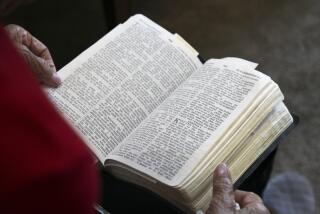The Visions of Jesus During the Years A.D.
- Share via
Who was Jesus?
Albert Schweitzer was among the first this century to ask that question in print, publishing “The Quest of the Historical Jesus” in 1906. Lately, others have explored the subject. Some make their claims with a scientist’s caution. Others go for shock value.
*
Scholarly books for non-scholars:
* John Dominic Crossan’s “Jesus: A Revolutionary Biography” (HarperSanFrancisco) casts him as a political agitator who never claimed to be divine. A New Testament professor at DePaul University in Chicago and co-chairman of the Jesus Seminar, Crossan holds that the Gospels’ best-known stories about Jesus’ life are myths. Still, he concludes that his theories do not contradict the fundamentals of the Christian faith.
* Burton Mack’s “The Lost Gospel” (HarperSanFrancisco) presents “The Book of Q” (Q for Quelle, or “source” in German). He and other scholars believe it once existed, is now lost and was made up of quotes from Jesus which the New Testament Gospel writers inserted into their own books. Mack is on the faculty of the School of Theology at Claremont.
* John P. Meier’s “A Marginal Jew: Rethinking the Historical Jesus” (Doubleday) aims to distinguish Jesus the man from what later teachings made him out to be. It shows him as one of at least seven children who probably married, but remained celibate for religious reasons. A New Testament professor at Catholic University in Washington, Meier holds that his proposals do not conflict with the fundamentals of Christian faith.
* A.N. Wilson’s “Jesus” (Norton) reads like a popular biography, with footnotes. A British journalist, Wilson examines several theories that are explored in more scholarly detail by Crossan and Meier.
*
A crossover case, where showmanship all but outdoes scholarship:
* “The Five Gospels,” by Robert W. Funk, Roy W. Hoover and The Jesus Seminar (Macmillan), is arguably the most controversial new book about Jesus. The combined work of Bible scholars across the country, it concludes that Jesus said just 18% of what has been attributed to him for centuries.
*
Books by scholars that emulate the genre of fictionalized biography:
* John Shelby Spong’s “Born of a Woman?” (HarperSanFrancisco) is his 14th book on New Testament topics. An Episcopal bishop and Jesus Seminar member, he proposes here that Jesus’ mother, Mary, was not a virgin, and that the marriage feast at Cana, a well-known Gospel story, is about Jesus’ own wedding. This book follows Spong’s “Rescuing the Bible From Fundamentalism” (HarperSanFrancisco), in which he asserts that Paul the Apostle was a homosexual.
* Barbara Thiering’s “Jesus and the Riddle of the Dead Sea Scrolls” (HarperSanFrancisco) presents an entirely different picture. Among her proposals: Jesus came from Qumran, home of the now famous scrolls; he was married twice and had three children, and he did not die on the cross but was drugged and later revived. Thiering is on the religion faculty of Sydney University, in Australia.
*
Among the first books to relate the new image of Jesus to contemporary faith:
* Marcus J. Borg’s “Meeting Jesus Again for the First Time” blends biographical details with early church history, to show how and why the facts were embellished. Borg’s “Jesus, A New Vision” (HarperSanFrancisco) is a biography. He is a professor of religion at Oregon State University and a Jesus Seminar member.
More to Read
Sign up for our Book Club newsletter
Get the latest news, events and more from the Los Angeles Times Book Club, and help us get L.A. reading and talking.
You may occasionally receive promotional content from the Los Angeles Times.








